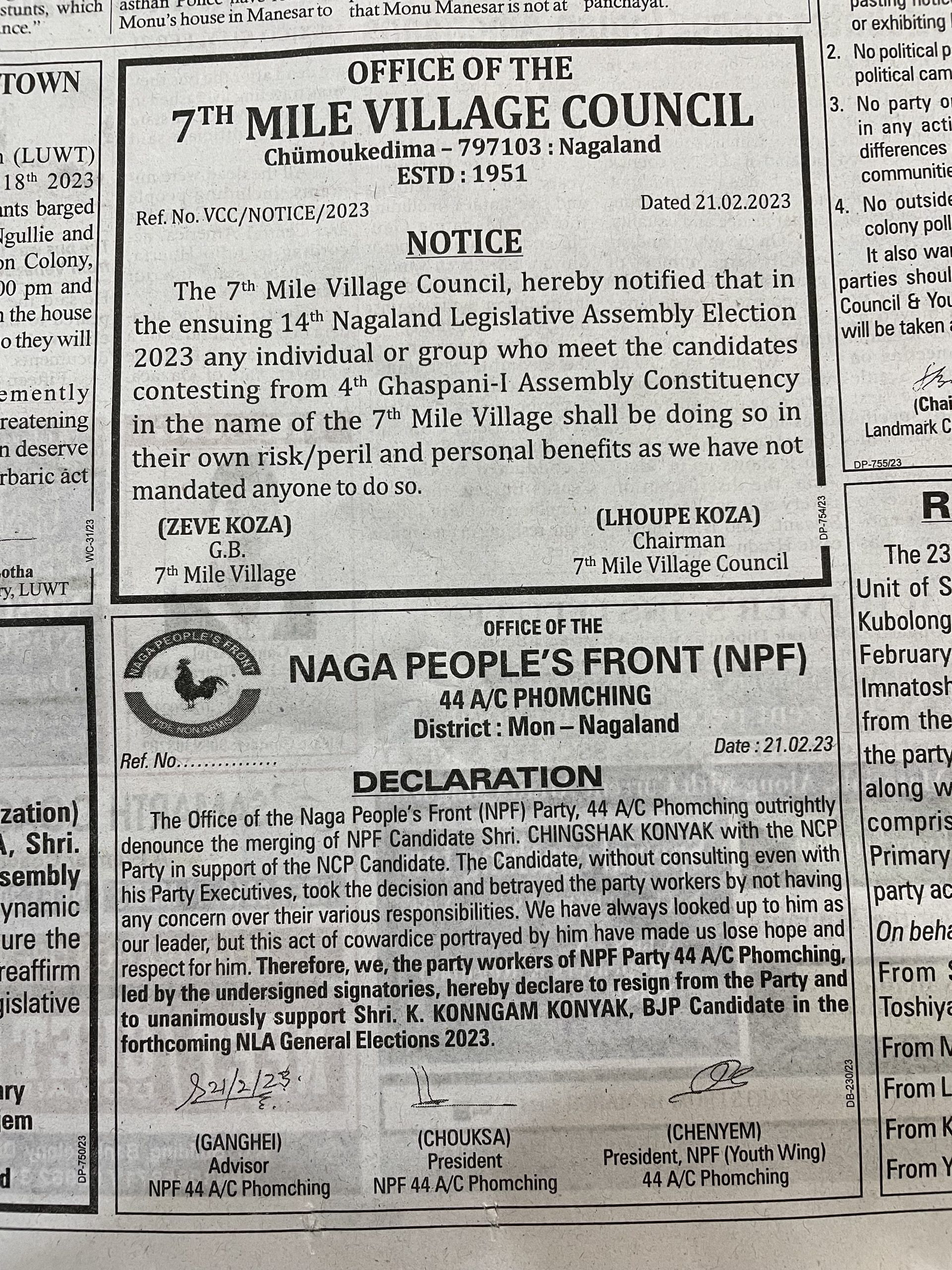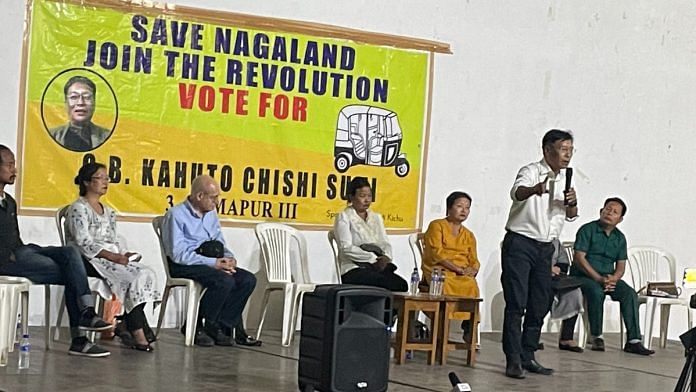Kohima/Dimapur: Any individual or group that meets [political] candidates at the Ghaspani I assembly seat in Dimapur, in the name of the village were doing so without authorisation and for personal benefits, reads a public notice issued in the Nagaland Post by the 7th Mile Village Council on 22 February.
The following day, the Kiyeto Village Council and the Kiyeto Ghami Baptist Church of the district also issued a declaration that said “no voters in the village would seek cash, material or other inducements” from any candidate.
Newspapers in poll-bound Nagaland carry multiple such notices every day, as well as some village councils declaring their allegiance to a candidate.

The state goes to polls on 27 February. The counting of votes will take place on 2 March.
The issue of free and fair polls, minus money and other inducements for voters, is a goal that has long eluded the electoral process in this northeastern state whose main electoral concern — resolution of the Naga political issue — is pending for over 30 years now.
However, this election season, several organisations, a handful of candidates and some village councils are trying to change that, with the Baptist church taking the lead with its ‘Clean Election Campaign’ — an initiative that started in the run-up to the elections but, according to church officials, will continue, with plans to include chapters on clean elections in the Sunday School curricula.
Also Read: Delhi not serious about solving Naga political issue, people not happy: Nagaland ex-CM Shurhozelie
‘Ray of hope’
In Dimapur III, G.B. Kahuto Chishi is an Independent candidate in the fray for the elections. The constituency has a woman candidate — Hekahni Jakhulo — contesting on the Nationalist Democratic Progressive Party (NDPP) ticket, with the likes of Assam Chief Minister Himanta Biswa Sarma and other heavyweights campaigning for her.
Yet, Chishi’s modest meetings are seeing sizeable turnouts and his statements met with raucous cheers from the crowd, of the kind usually reserved for rock concerts.
Addressing a meeting at Mandeville Garden in Chumukedima Thursday, Chishi talked about the helicopters that fly in candidates and money: “I won’t pay you to vote for me. If I do so, then the money actually meant for you will be over and I will not be able to do any actual work. Only if I do not pay you to vote for me can I use the money for your welfare when I am elected.”
His audience applauded in agreement.
For many people, including those indifferent to the electoral process by their own admission, Chishi has come as a ray of hope.
Nini Niphooli, assistant pastor at the Kohima City church and a mother of two, has never voted in her life. “I do not care about politics, it is full of corruption. My name is in the voter list in my village but I never go there. But I am following every word that Chishi is saying. If he was in my constituency, I would have voted for him.”
It was at this church that a call for voters to be judicious in their choice and to vote “without influence or intimidation” was issued last week.
Among Chishi’s audience at Mandeville Garden was a young housewife Lily Chishi, who said: “I just came to listen to him because I had heard about him from my friend. Politics here is very corrupt. Other candidates have already started going door to door, offering money — some for individual votes, some for full families. Rates vary between Rs 4,000 and 6,000… for one vote.”
Chishi, who belongs to the Sumi Naga tribe, uses his identity in his campaign material.
Asked if he is playing the tribal card, Chishi told ThePrint: “Oh no, you are mistaken, that is to shame the Sumis. They are my biggest opponents. That is because they are greedy. I am trying to shame them. I have been an activist for more than seven years and people know I have it in me to get things done.”
Also Read: Three-term Nagaland CM, serial BJP ally — the importance of being Neiphiu Rio
‘Marred by rampant use of money, violence…’
There is not much hush-hush about the corruption in the Nagaland electoral process — academic papers have been written about it.
Talking about the process, starting from the first assembly elections conducted in the state in 1964, Phyobenthung, an assistant professor in the department of political science at Fazl Ali College, Mokokchung district, wrote in a paper in 2018: “ …most of these elections were marred by rampant use of money, violence, threat, and bogus voting.
“Elections have become festivals in Nagaland. Voters wait for elections to indulge in election feasts, substance abuse, and to earn money by selling their votes. It is also characterised by threats and intimidations from clans and villages…”
The problem is complex, said Vilo Naleo, convenor of the ‘Clean Election Campaign’, launched by the Nagaland Baptist Church Council, which has 24 associations affiliated to it.
“You have to understand that the western idea of democracy of each person voting as per his or her own conscience is different from the system in Nagaland where the family head or the village elder often decides for the whole family or the village,” Vilo told ThePrint.
He said among the Semas (or Sumis) and Konyaks, for example, the ‘ang’ or the king is very powerful and often makes such decisions. Chekesangs, Konyaks and Sumis are among the 17 recognised tribes in Nagaland.
“In 2018, after the elections, an analysis showed that most proxy voters voted for women and youth. That is why we started to reach out not just to churches and village councils but to also women and youth organisations… we are planning to include this in the Sunday school curriculum and in what students are taught in primary schools,” Vilo added.
Vilo said that the church has joined hands with the Chekesang People’s Organisation and the Western Sumi Association in this regard. The Chekesang Mothers Association is taking the lead in the village Phek in checking incoming cars for liquor or other inducements ahead of voting day, he added.
The dilemma
In the reserved constituency of Tseminyu, Joel Naga, a graduate from Delhi University’s St Stephen’s College, is fighting on a ticket of the newly launched Rising People’s Party.
The RPP was launched in 2021 with an aim to reform the political process and to bring in more transparency, according to the party’s preamble.
Naga is the only candidate that the party has fielded and, so far, the response to his campaign has been good. But so ingrained is the money issue in the political process that the party is now facing a strange dilemma.
A member of the party told ThePrint: “See, the response is good but we have a dilemma. The practice of cash for votes is on for so long that when we go out we do not know what to do. We fielded one candidate to concentrate all our resources. We are fighting to prove clean politics is possible, but if we pay to win then our point is defeated. If we don’t, our candidate is defeated. People are asking for money in the range of Rs 1 lakh for some 2-3 votes.”
(Edited by Anumeha Saxena)
Also Read: This election season in Nagaland, drugs an ‘allurement for voters’



